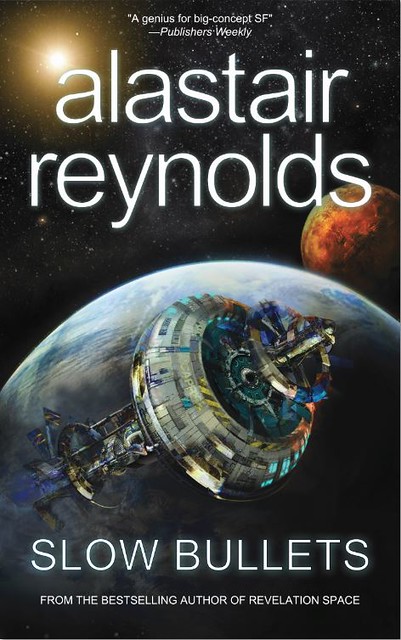 If you are unfamiliar with the various works of author Alastair Reynolds, then Slow Bullets
If you are unfamiliar with the various works of author Alastair Reynolds, then Slow Bullets
If you have any hesitations whatsoever about reading this story, read Richard Dansky's review in The Green Man Review:
Wars do not end neatly. While treaties may be signed and victories declared, there's always room around the edges and in the grey spaces away from cameras and central command for those more interested in brutality than resolution.Such is the starting premise of Alastair Reynolds' novella Slow Bullets, which puts protagonist Scur in the entirely illegal clutches of a brutal enemy soldier. The ancient war the two have been fighting on opposite sides of is over, but on the ground that doesn't matter—Scur is captured, tortured, and left for dead with the ticking time bomb of a second "slow bullet"—a combination internal hard drive and dog tag implanted in every soldier—injected into her. Tougher than her captor thinks, Scur cuts out the second bullet, but that merely sets up the real conflict.Scur later awakens onboard a giant transport vessel, prematurely awakened from hibernation, or so she thinks. The ship itself is in trouble, filled with a mix of war criminals, soldiers from both sides, and confused and terrified crew. It's also arrived a little late, as the green and lush planet it was supposed to arrive at after the war—now a dim and distant memory—appears to be undergoing an ice age, the sort of development that rarely occurs overnight.The story has all the components of a classic disaster scenario, especially once Scur spots the man who captured her among the faction-riddled passengers. In lesser hands, that's perhaps what it could have been, with Scur and her nemesis pursuing each other across the wounded ship until there was some sort of climactic confrontation, preferably backlit with explosions. But Reynolds doesn't take the easy way out. Rather, the obvious conflict is contextualized, with the bigger problems—what's wrong with the ship, what can be done about it, how can groups of people for whom war is still fresh in their recently unfrozen minds be drawn to work together—taking center stage and the personal conflict viewed more as a threat to bigger, fragile solutions.The pace of the novella is never less than breakneck, even if the incidents being discussed don't fit neatly into conventional action beats. Reynolds sketches the evolution of this unconventional, highly combustible society with a sure hand, eliding unnecessary detail while laying out the key components in stark detail. There's no wasted space here, no digressions into pointless technobabble or infodump for the sake of showing off the world building. Indeed, even the slow bullets of the title get described as much by implication as by exposition, which can lead an unwary reader to assume they've stumbled into a segment in an ongoing series. The fact that the ideas of the book are so big—the source and implications of the untimely ice age, the scale of the just-ended war, the questions of faith and memory and society that drive the action onboard ship—that it seems impossible for them to be given their due in something novella length. And yet Reynolds manages it while effortlessly sidestepping the more conventional questions one would expect him to have to answer—what happened to the ship, the larger details of the war—remain thoroughly sidelined. It is enough that things have happened, and Slow Bullets looks resolutely to the future instead of shoring up its universe's past.At its core, Slow Bullets is a hopeful book, a cry against the darkness of seeming inevitable destruction. Scur and her shipmates, against all odds, manage to create something in the midst of a scenario primed instead for bloody destruction, and they give freely of themselves to do so. The greater good is ultimately affirmed as something worth striving and sacrificing for, even if the personal cost is high. But that doesn't mean it's a happy or cheerful book, rather just an eminently worthwhile one.

No comments:
Post a Comment